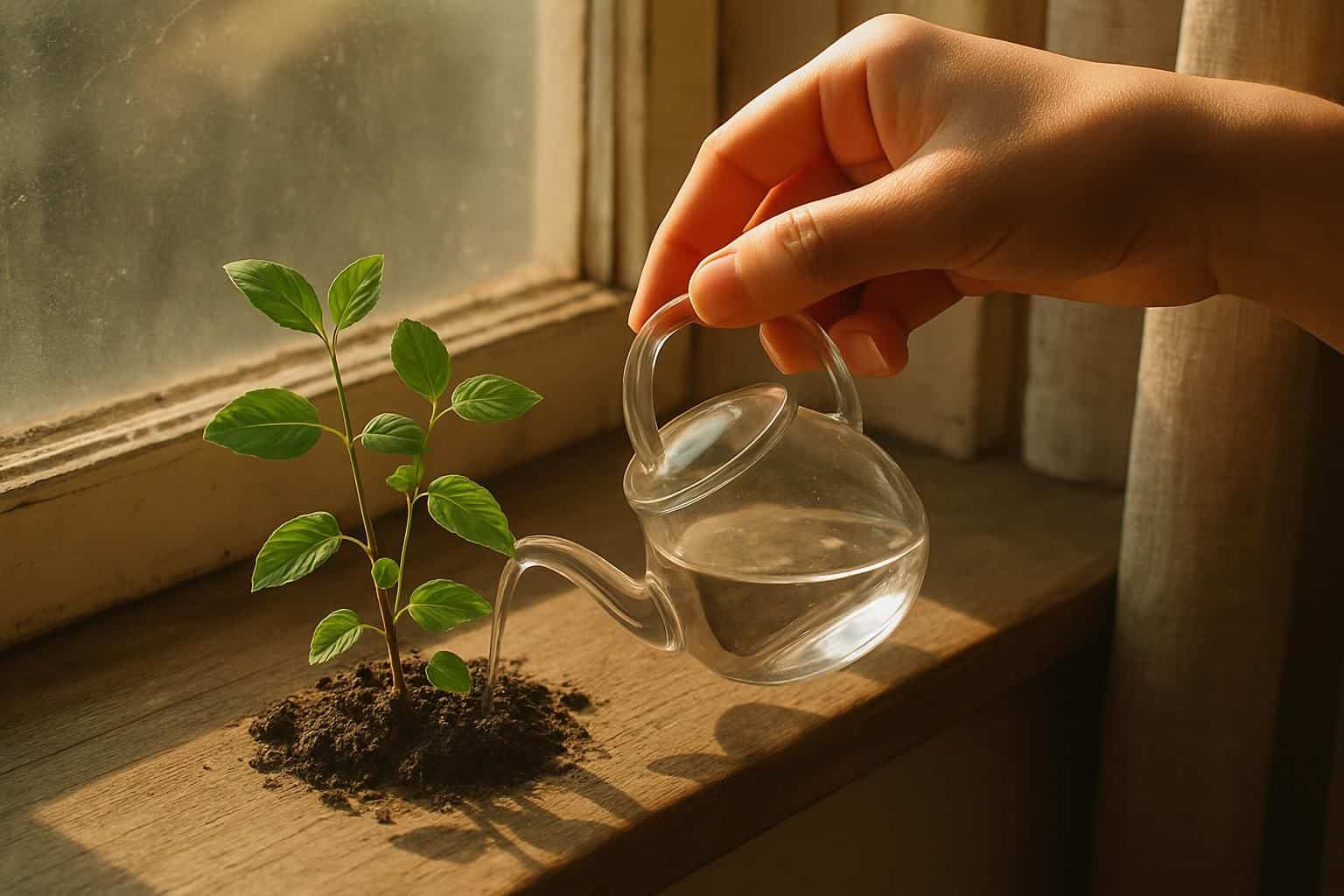If you struggle to say no or always go overboard with habits like drinking, shopping, or screen time, you may wonder how to deal with an addictive personality. About 10 percent of Americans face problems caused by addictive behaviors at some point in their life.
This guide will show clear steps and coping mechanisms you can use each day to improve your mental health, set healthy limits, and take back control. Read on for practical tips that could save your life.
Key Takeaways
Around 10% of Americans struggle with addictive behaviors at some point—often showing anxiety, impulsivity, or a tendency to take risks.
Genetics heavily influence addiction: alcoholism is roughly 60% influenced by genes, and childhood trauma raises addiction risk by two times.
Increasing self-awareness through journaling or meditation helps control addictive behaviors; learning how to set clear boundaries, like comfortably saying “no”, also helps.
Professional support can include CBT therapy, women-focused support meetings, or medication; combining medication with counseling often provides the most benefit.
Sleeping 7-8 hours every night, eating balanced meals daily, and getting at least 30 minutes of exercise five days a week reduces cravings and lifts your mood.
Table of Contents
Recognizing an Addictive Personality

Spotting an addictive personality starts with knowing the warning signs in yourself or others. People with these traits often jump from one obsession to another, whether it’s shopping, gambling, or substance use.
Common traits of addictive personalities

Addictive personalities often share common patterns that make daily activities tough to manage. These traits usually show up before addiction fully develops and can impact many sides of life.
Common Traits of Addictive Personalities
- Anxiety and depression often pop up together in people prone to addiction. I’ve noticed it firsthand within my own family—stress tends to trigger unhealthy coping habits.
- Impulsivity appears as acting quickly without considering consequences, like buying items impulsively or making risky choices for instant pleasure.
- Frequent risk-taking behaviors become common for those inclined toward addictive habits. They seek thrills from dangerous situations, chasing a feeling of excitement.
- Obsessive thinking about specific activities takes over a person’s thoughts, even during important or unrelated tasks.
- Continued cravings for more—even despite negative outcomes—point clearly to addictive patterns. Even as money issues and strained relationships pile up, the behavior continues.
- Struggling to stick to personal limits becomes a frequent issue. A person may promise themselves just two glasses of wine, yet finish the whole bottle before realizing it.
- Lying to cover up behaviors often happens. This could include secret purchases with hidden credit cards or removing evidence entirely.
- Pulling back from social activities often follows intense addictive habits. Friends or family relationships get sidelined as the addictive behavior takes priority.
- Weak impulse control makes urges harder to resist. The reward signals from the brain overpower logical reasoning during these moments.
- Using substances and behaviors as emotional coping tools occurs commonly. Many women turn to eating, shopping, or alcohol to manage stress and painful feelings.
Signs and symptoms to look for

Spotting early signs of an addictive personality can help you—or someone you care about—get support before things spiral out of control. Powerful urges and losing control over certain behaviors can signal addictive traits. You might find it tough to stop an activity—even when you genuinely want to stop—just as a person coping with heroin addiction might struggle despite wanting to attend a heroin addiction treatment program California offers. Here are key warning signs to watch for:
- Powerful urges and losing control over certain behaviors can signal addictive traits. You might find it tough to stop an activity—even when you genuinely want to stop—just as a person coping with heroin addiction might struggle despite wanting to visit this website for support.
- Withdrawing socially and avoiding friends or family members often happens because the addictive activity takes priority, becoming your main focus.
- Increasingly risky actions can surface once everyday activities fail to provide excitement. You may drive recklessly, spend too much money, or engage in behaviors that place your safety at risk.
- Poor performance at work or school can result from distractions created by addictive urges. Tasks you once handled easily may now seem tough or overwhelming.
- Financial issues often emerge as more money flows toward the habit. Debt on credit cards, unexplained charges, or borrowing money can reveal an addiction taking hold.
- Continuing harmful behaviors even after clear negative effects signals addictive tendencies. Addiction can hijack the brain’s reward system, causing logic to take a back seat.
- Sudden mood swings or grumpy behavior can appear, especially if you’re unable to do the addictive activity. Changing brain chemistry often fuels these emotional shifts.
- Lying, secrecy, or attempts to hide your actions can mean you’re aware something isn’t quite right. Keeping things hidden protects the habit from outside judgment or interference.
- Physical changes—like trouble sleeping, shifts in weight, or declining hygiene—often come along with addictive habits. The body can reveal what your mind tries hard to conceal.
- Repeatedly failing to cut back or stop a behavior can show the pull addiction has in your life. People often make many attempts to quit before finally reaching out for professional support.
Understanding the Causes of Addictive Personality

Addictive personalities stem from a mix of DNA and life experiences. Brain chemistry, past trauma, and family history all play key roles in how these patterns develop.
Genetic factors

Your genes have a big impact on your addiction risk. Studies show alcoholism is around 60% heritable—this means more than half your vulnerability comes directly from DNA. If your parents had issues controlling alcohol, you’re about 35 times more likely to have similar struggles yourself.
Certain genes make your risk higher, such as the CHRNA5 gene variation, which doubles your chance of nicotine dependence. On the other hand, some genetic variations offer protection.
The ALDH2 gene variant, for instance, lowers alcoholism risk by nine times.
Our genes load the gun, but our environment pulls the trigger.
Family history provides important clues about personal risk. Your DNA doesn’t automatically mean addiction will happen—but it sets a foundation that makes you more sensitive to substance-related problems.
Many women with addiction in their families experience stronger cravings, and their bodies often react more intensely to drugs or alcohol. Understanding these genetic links clarifies why some individuals find it difficult to control impulses, and why addiction issues frequently pass along family lines.
Environmental influences

Genes can influence addiction risk—but your environment matters equally. Difficult childhood conditions often push someone into addictive behaviors. Poverty creates constant stress, which makes escaping through substances extra tempting.
Living somewhere drugs are easily available increases exposure and makes using seem normal. A Swedish study found childhood trauma doubles the risk of addiction—past pain strongly affects current choices.
Social connections shape behaviors, too. Friends who regularly drink or do drugs create pressure for others to join. Many women begin using substances to fit in or ease social anxiety.
Family interactions teach coping methods—both good and bad. Children observing their parents handle stress by drinking often copy the same behavior. To break away from these negative patterns, forming healthier social connections and learning substance-free stress management skills can make a difference.
Mental health connections
Mental health struggles often drive people to addiction. Those with addictive personalities frequently deal with additional emotional challenges too. According to the National Alliance on Mental Illness, roughly 40 million adults in the U.S.—that’s about 19.1%—live with anxiety disorders.
Teen depression has also seen a significant rise, climbing from 8.1% in 2009 to 15.8% in 2019. These emotional issues often lead individuals to substances as a way to cope. People might lean on addictive games or use drugs to relieve anxiety, sadness, or painful emotions.
Mental health and addiction often feed into each other in a vicious loop. Conditions like PTSD, bipolar disorder, and schizophrenia increase someone’s risk of developing addictive habits.
Around 16.9% of people have traits linked with impulsive behavior, which encourages risky choices around substances. Often, people try to fix emotional pain through self-medication rather than reaching out for professional help.
This approach creates a harmful cycle: addiction worsens mental health, and poor emotional health then pushes people deeper into addictive behaviors. Addressing both mental health concerns and addiction together offers the best chance to break this cycle once and for all.
Strategies for Managing an Addictive Personality

Mastering an addictive personality requires clear strategies that work in daily life. These methods help you gain control through self-awareness and practical skills that break harmful cycles.
Building self-awareness
Self-awareness is your starting point for managing addictive behaviors. If you have addiction-prone tendencies, simple habits like journaling can offer significant benefits. Writing regularly lets you notice habits, patterns, and triggers clearly and objectively.
Meditation, practiced daily, gives you a calm space to watch thoughts pass without labeling them good or bad—this helps you spot unhealthy impulses before they become overwhelming.
Professional therapy gives you expert support while uncovering hidden aspects of yourself that you may overlook. Sure, these strategies require persistence and patience—but many women find the resulting insight worth every bit of effort.
They often report improved awareness leads to faster recognition of warning signs and healthier decisions moving forward.
Better self-understanding is just your first step toward lasting self-control. From there, explore mindfulness methods designed to build directly on increased personal awareness.
Practicing mindfulness and self-control
Building your self-awareness gives you better control over your actions—and mindfulness combined with self-control can help you manage addictive personality traits. Try these simple yet powerful approaches:
- Practice short daily meditation to quiet your mind and ease impulses tied to addictive habits. Even just ten minutes a day can boost your impulse control significantly.
- Use deep breathing exercises in tense moments or when cravings hit hard. Breathe in slowly for four counts, hold gently for four more, then exhale slowly over six counts, signaling your body to relax.
- Apply the “pause technique” to create distance between an urge and your reaction. Simply stop, count slowly to ten, and give yourself breathing room before responding to temptation.
- Do regular physical activities to strengthen your willpower and lift your mood naturally. Even a quick thirty-minute walk can weaken cravings and boost mental well-being.
- Keep a daily journal to notice patterns behind addictive behaviors. Write down events, feelings, and thoughts connected to unhealthy actions to understand your triggers clearly.
- Practice mindful eating to foster patience and calm attention—skills you can carry into other parts of your life. Slow down and really notice how food tastes and feels, rather than rushing through meals.
- Set up mindfulness reminders on your phone to build structured breaks for practicing self-control. These short, quiet moments quickly reset your mental focus during the day.
- Try body scan exercises to reconnect with physical sensations instead of impulsively acting out. Begin noticing feelings in your toes, gradually move attention upward, and calmly acknowledge each sensation.
- Join a support group to find accountability, encouragement, and practical tips for practicing self-control. Listening to others can strengthen your resolve and help you feel connected instead of alone.
- Use cognitive-behavioral therapy (CBT) methods to change thoughts driving your addictive behavior. Catch negative, automatic thoughts early, challenge their logic, and replace them with something healthier and more constructive.
Setting healthy boundaries
Healthy boundaries matter—a lot—for women who deal with addictive behaviors. They protect your emotional health and help you break harmful cycles.
- Get comfortable saying “no” without feeling guilty, especially to people who encourage harmful habits. Real friends will understand, respect your decisions, and support your recovery.
- Set clear rules about triggers—such as substances or certain activities—that can lead to setbacks. Explain to friends clearly, “I can’t join parties where people drink”, if alcohol is your trigger.
- Spend less time around those who stress you out or push unhealthy choices on you. Stress and pressure can quickly send you back to old habits, especially if impulse control is already a challenge.
- Clearly tell people exactly what you need rather than expecting them to guess. Easy statements, like “I need some alone time now”, help you avoid misunderstandings and frustration.
- Decide beforehand what happens if people cross your boundaries—and stick to your decision. Consistent follow-through helps everyone understand you’re serious about protecting yourself.
- Treat self-care as an absolute priority every single day. Plan regular breaks, healthy eating, and exercise routines that directly support your recovery goals.
- Join a support group to practice setting limits and to hear ideas from others. Group members often have valuable tips, encouragement, and practical strategies to share.
- Exchange unhealthy activities for positive hobbies that meet your emotional needs. New hobbies—like volunteering, art classes, or hiking—can help you feel fulfilled and support lasting recovery.
- Begin slowly by choosing just one or two key boundaries to focus on. Small successes lead to bigger confidence—and eventually bigger achievements.
- Regularly review your boundaries and adjust them whenever your feelings or situations change. Recovery is ongoing and flexible, so your personal limits should be too.
Seeking Professional Help

Professional help offers a path to recovery through therapy, support groups, and medical options that match your needs – read more to find out which treatment might work best for you.
Therapy and counseling options
Therapy and counseling can truly change your fight against addictive behaviors. Seeking professional help, such as enrolling in a dedicated heroin addiction treatment program San Diego CA, can offer effective approaches to help women develop stronger coping skills while also addressing deeper causes behind addiction.
- Cognitive-behavioral therapy (CBT) reduces impulsive actions and reshapes negative thinking habits. This strategy gives you practical tools to handle triggers, with research from 2019 highlighting success in treating personality disorders.
- Family therapy rebuilds relationships and fosters a healthier support network. Recent 2023 studies show it can repair strained family relationships that often contribute to addictive behaviors.
- Group therapy lets you connect with others who face similar struggles, helping ease social isolation. Women sometimes feel comforted by sharing their stories and gaining strength from peers who genuinely understand.
- Motivational Interviewing strengthens your internal determination to replace harmful behaviors. This option suits women feeling uncertain about their strength to break free from addiction.
- Dialectical Behavior Therapy (DBT) equips you with skills to manage intense emotions and handle distress effectively. It’s especially helpful if you experience mood swings or struggle with impulse control.
- Trauma-focused therapy addresses painful past experiences that could fuel addictive patterns. Many women find comfort and healing by safely confronting difficult memories.
- Holistic counseling blends traditional therapy methods with wellness routines like meditation or stress reduction exercises. This therapy type helps address mental and physical health issues together.
- Online counseling provides flexible support that fits a busy lifestyle or helps maintain privacy. Virtual therapy sessions still offer the full advantages of face-to-face appointments—with added convenience.
Support groups and communities
Support groups and community networks can make a huge difference for women struggling with addictive personalities. They offer a safe, supportive space for women to openly discuss their challenges, share experiences, and learn practical coping methods from peers.
- Twelve-step programs build essential coping skills and offer continuous support, improving the odds of long-term sobriety.
- Peer support circles significantly decrease cocaine relapse risks by allowing participants to learn from each other’s personal recovery experiences.
- Women-only groups tackle addiction issues unique to females, providing a safe, comfortable environment to openly discuss sensitive subjects.
- Online communities offer around-the-clock support—perfect if you’re busy or just can’t make it to meetings in person.
- Family support groups educate relatives about addiction and help them learn how to show support without unintentionally enabling unhealthy behavior.
- Mutual aid networks give psychological benefits by encouraging participants to support others, creating a sense of purpose and community along the path of recovery.
- SMART Recovery offers practical, evidence-based strategies as an alternative to traditional twelve-step programs, providing useful tools to change unhealthy behaviors.
- Local community centers often offer affordable or free support sessions led by trained professionals or people who have recovered themselves.
- Rehab alumni programs connect you with others who’ve completed the same treatment, helping you create supportive networks that last.
- Building strong social support connections makes staying drug-free easier and supports overall mental well-being throughout recovery.
Creating healthy coping skills pairs naturally with support group participation, working together for a well-rounded recovery approach.
Medication-assisted treatments
Support groups give women valuable social connections. But addiction often requires medical help too. Medication-assisted treatments combine counseling and specific medications to treat substance use disorder.
These treatments lessen withdrawal symptoms and ease cravings. SAMHSA’s National Helpline provides free, confidential referrals to these services. It’s available around the clock, offering assistance in both English and Spanish.
Women dealing with addiction-linked mental health concerns might receive specialized medications from their doctor. Selective serotonin reuptake inhibitors (SSRIs) can help tackle depression, which commonly goes hand-in-hand with addiction.
Anti-anxiety medications may also be useful in a comprehensive recovery plan. Medications work most effectively alongside talk therapy, counseling, and healthy lifestyle changes. Doctors perform careful psychiatric assessments to identify the best medication combination for each woman’s specific situation.
Coping Techniques for Everyday Life

Daily life with an addictive personality needs simple tools to stay on track. Small changes in your routine can break harmful patterns and build a life free from addiction’s grip.
Developing healthier habits
Overcoming addictive behaviors begins with establishing healthier, everyday habits. Even small, simple changes can significantly help manage addiction tendencies:
- Stick to a regular sleep pattern, getting about 7-8 hours each night, since sleep helps cut down impulsive actions linked to addiction.
- Plan meals that include proteins, whole grains, and veggies—this balanced diet can improve mood stability and reduce cravings that fuel substance use.
- Start moving your body—try walking for just 10 minutes at first, then gradually increase to 30 minutes at least five days a week. Regular exercise naturally improves mood and fights addiction.
- Spend five minutes each day practicing meditation or deep breathing exercises, calming your emotions and decreasing anxiety-related issues.
- Pick a hands-on hobby, something like gardening, knitting, cooking, painting, or woodworking, to keep busy, divert attention, and lessen compulsive urges.
- Aim to drink eight glasses of water each day—staying hydrated helps prevent confusing thirst with addictive cravings.
- Schedule weekly meet-ups or phone chats with friends who support and understand you; maintaining these social connections can reduce isolation related to addiction.
- Limit phone use through apps or built-in timers, controlling device habits that often feed impulse control problems and addiction risks.
- Jot down daily feelings, triggers, or behaviors in a simple journal—tracking your moods builds self-awareness and helps manage addictive patterns.
- Swap unhealthy rewards for healthier perks like relaxing bubble baths, a tasty herbal tea, or buying a new book you enjoy; positive rewards help reset your body’s pleasure response.
Establishing a strong support system
A solid support network gives women the strength to resist addictive behaviors. Your connections offer emotional strength and accountability during difficult periods.
- Connect with reliable friends who genuinely understand your struggle without judging you. Lean on them in tough times, and include them when you celebrate progress.
- Join recovery communities such as Alcoholics Anonymous (AA), Narcotics Anonymous (NA), or SMART Recovery. These groups offer meaningful connections through shared experiences and effective recovery techniques.
- Set clear boundaries with people who may trigger your substance use. Spend less time around friends who heavily drink or use drugs if their habits tempt you.
- Establish a relationship with mental health professionals experienced in addiction issues. Therapists, counselors, and medical providers can help guide you through each step of recovery.
- Talk openly with your family about what support looks like for you. Honest conversations about your mental health can build stronger family ties, creating a safer and calmer home.
- Connect with mentors who successfully managed struggles similar to yours. Their real-life stories can encourage you and offer useful strategies to handle daily situations.
- Use online recovery groups or platforms, if face-to-face support isn’t accessible. Social media groups, recovery-based forums, and mobile apps can offer round-the-clock encouragement.
- Schedule regular check-ins, like weekly coffee meet-ups or a monthly support group. Routine interactions with your support circle help maintain steady progress and accountability.
Stress relief practices, combined with meaningful social support, set you firmly on your path to lasting recovery.
Avoiding triggers
Triggers can sneak up and pull you back toward harmful habits, even if you’re doing great. Knowing how to spot these risky situations and sidestep them early is a big part of staying clean and healthy.
- Watch out for the HALT signs—hungry, angry, lonely, or tired. These four states often lead to cravings or poor decisions.
- Make a list of specific people, locations, or activities that tempt you to use again, then create clear ways to stay away from them.
- Change your daily paths—like routes to work or favorite hangouts—to avoid shops, bars, or other spots that trigger impulses.
- Try out new activities or hobbies that keep you entertained; boredom is a common reason people turn back to substance use, according to research.
- Spend at least 10 minutes each day on simple mindfulness or meditation practices. The habit can help you stay calm when stress hits.
- Surround yourself with friends who support your recovery, truly understand the struggle, and will step in during hard times.
- Remove phone numbers or online connections of anyone who supplied substances or regularly uses them.
- Before going to social gatherings, prepare by bringing appealing non-alcoholic beverages, and have an easy plan to leave early if cravings get intense.
- Notice your early body signals and thought patterns that hint you’re moving closer to slipping—catching these signs quickly can stop setbacks.
- Develop stress-relief skills that are enjoyable and healthy—like exercise, art, or music—to trigger positive brain chemicals without negative effects.
Preventing Relapse

Preventing relapse takes daily work and a solid plan. You need to spot the warning signs early and build a safety net of people who will keep you on track.
Recognizing early relapse warning signs
Recognizing relapse signs early can protect your progress. Relapse occurs gradually, often showing emotional signals way before substance use happens.
- Sudden mood shifts become stronger and happen more often. One minute you’re calm—then sadness or anger appears, without a clear trigger.
- You start avoiding family and friends who normally support you. Pulling away helps you dodge uncomfortable talks or judgment.
- Regular self-care routines start slipping away. Skipping meals, ignoring hygiene, and dropping workouts all point to emotional relapse signs.
- Sleep schedules shift dramatically—either you can’t sleep or you sleep way too much. These disturbances indicate emotional strain.
- Past memories of using substances begin feeling appealing rather than risky. Viewing past drug use positively hints at mental relapse.
- You begin to underestimate risk, thinking things like, “Just once won’t matter”. Poor impulse control like this endangers your recovery.
- Attendance at support meetings drops, with lots of excuses about skipping. Avoiding these groups frees space for addictive behavior.
- You ditch healthy coping tools normally used for stress. Without healthy methods, stress gradually piles up.
- Denying the obvious returns as a way to protect yourself. You brush off concerns from loved ones who notice warning signs.
- Physical cravings become stronger and more frequent. Your body and brain send signals demanding substance use.
Knowing these relapse signals helps you act quickly and build an effective prevention plan.
Creating a relapse prevention plan
A solid relapse prevention plan acts as a personal shield, helping you stay on track and avoid slipping into old addictive habits. To make this plan truly useful—and keep your progress steady—each part should be clear, practical, and tailored to you. Here are the key steps you should cover:
- Identify your individual triggers clearly—like dealing with heavy stress from work, hanging out with certain friends, or visiting places linked to old habits.
- Monitor emotional red flags closely. Anxious feelings, mood drops, irritability, or trouble controlling impulses often hint at relapse risks.
- Prepare practical responses for every single trigger. If stress is building, call a trusted friend, counselor, or use calming techniques—such as deep breathing exercises—to keep calm.
- Find healthy habits to take the place of addictive ones. Exercise works wonders, for example—it helps lift your mood and lowers emotional tension.
- Keep updated contact numbers for people ready to support you: understanding family members, close friends, or trusted counselors who know your situation well.
- Plan routine meetings with a mental health expert. Regular sessions let you make helpful adjustments as your recovery continues and your circumstances change.
- Set up daily routines to practice self-care regularly. Journaling, for instance, can let you sort out feelings clearly and spot important emotional patterns early.
- Organize emergency steps to handle crises quickly. Always have hotlines or emergency contacts ready, with clear guidance on getting immediate help.
- Define achievable, realistic goals. Recovery often moves in different directions, so small slips shouldn’t overshadow your overall progress.
- Regularly revisit your relapse prevention outline—changing it around as you notice new triggers or opportunities for growth.
Staying accountable
Accountability is key to getting through addiction recovery. For me, checking in regularly with myself kept old patterns from creeping back in. You need to surround yourself with folks willing to speak up if excuses start popping up.
Create a trusted circle—family, close friends, or even a counselor—to help track how you’re doing. Regular conversations and updates with these supporters can boost your strength on difficult days.
Many women find texting quick check-ins or having weekly coffee with an accountability buddy especially helpful.
Set clear goals you can actually measure, making it easier to stay focused in substance use recovery. Jot down those goals, then let your circle know about them. Writing goals out—and telling people about them—creates strong motivation to hold steady on your mental wellness path.
My own recovery got better after I started journaling daily struggles and wins against addictive behavior. Examples of good goals are going to support groups two times per week, practicing emotional coping skills each day, or hitting 30 full days sober.
Every small success gives you strength to go longer and helps keep relapses away.
Helping Someone with an Addictive Personality

Supporting a loved one with addictive traits means showing care without enabling harmful habits – learn how to offer help while setting clear limits, guide them toward expert care, and stay patient during their ups and downs.
Read on to discover more about this challenging journey.
Understanding their struggles
People struggling with addiction face tough battles daily. They often experience mood swings, struggle with coping skills, and feel urges they can’t control. Many women who care deeply about someone facing these issues can become confused by their actions.
But the person dealing with addiction isn’t choosing this behavior—their brain simply works differently. They naturally seek substances or behaviors that deliver brief, comforting pleasure.
It’s not about weak willpower or personal flaws.
Mental health has a big influence on addiction struggles. Often, anxiety and depression show up right alongside substance-use problems, making things tougher. One challenge fuels the other, creating a hard cycle to break.
A person may turn to drugs or alcohol to escape painful emotions, only to feel even worse afterward. Labels like “addictive personality” don’t help and can lead to feelings of shame.
Instead of judging their choices, try viewing them as individuals beyond their addiction. A person’s actions result from their genetics, past experiences, and current emotional health.
Encouraging professional help
Reaching out to addiction experts can truly transform women’s lives, offering essential guidance and practical tools beyond what family or friends alone can give.
- Bring up therapy options openly, highlighting how professional help can boost everyday life, rather than focusing too much on old mistakes.
- Pass along helpful resources like SAMHSA’s National Helpline at 1-800-662-HELP, available anytime, connecting callers to nearby treatment centers and support services.
- Recommend checking out FindTreatment.gov to easily discover local mental health and addiction specialists familiar with addictive behavior.
- Offer to come along to the initial appointment, easing anxiety around starting mental health or addiction treatment.
- Clarify how therapy tackles deeper emotional causes behind addiction—instead of just symptoms—for better and longer-lasting recovery results.
- Explain how support groups foster connections with others dealing with similar struggles, reducing loneliness that’s common with addiction.
- Mention that current addiction treatments often blend therapy and medication, making it more effective than choosing just one method.
- Emphasize that reaching out for help shows bravery and strength, marking an important step in reclaiming control over life.
- Share encouraging examples of women who’ve successfully overcome addiction by getting professional support, inspiring hope and motivation.
- Highlight that therapy teaches emotional management skills that stick around for life, unlike quick solutions that miss underlying emotional issues.
Patience and steady support go a long way, making recovery feel less overwhelming for someone you care about.
Being patient and supportive
Patience is key to helping someone overcome addiction. I saw this clearly when supporting my sister through recovery. Helping those you love through addiction means accepting that progress isn’t always steady—a rollercoaster with highs and lows is normal.
Managing your emotions calmly, even during setbacks, helps your loved one feel safe and supported. Many give up early, yet studies show that long-term, steady support greatly improves recovery success rates.
Your steady presence makes healing possible.
Support means more than kind words alone. You can help drive your loved one to therapy sessions, attend support groups with them, or help find treatment programs online. Listen openly, without judgment, as they share feelings about drug use or mental health struggles.
Hold back on criticizing behaviors like poor impulse control or pulling away socially. Instead, highlight any small step forward as real progress. Family involvement can lower relapse likelihood by as much as 40%, based on addiction studies.
Your well-being counts too—so reach out to groups designed specifically for family members coping with similar issues, to help you manage stress.
How Will Understanding and Managing Addictive Personalities Evolve in 2025?

The outlook for addiction treatment is becoming brighter, thanks to new insights on brain function and genetics. Recent studies highlight how the mecp2 gene influences addictive behavior, helping doctors find improved ways to treat patients.
This biological insight should benefit the 10-15% of people who have addiction-prone personalities. Doctors will blend counseling with medical approaches personalized to each patient’s needs.
Early intervention will soon become a regular practice, particularly among teenagers dealing with family troubles or high stress.
By 2025, support structures will become stronger, as rehab centers partner closely with local communities and organizations. Mental health experts will gain deeper insights into how addiction connects to conditions like anxiety, ADHD, and depression.
People will also learn how childhood experiences affect the likelihood of substance misuse later in life. Digital apps and monitoring tools will help track relapse warning signs, quickly linking patients to support networks.
Combined medical advancements, personal attention, and active communities will open more recovery opportunities for women struggling with addictive behaviors.
People Also Ask
What is an addictive personality?
An addictive personality describes certain traits that make a person more prone to substance abuse or compulsive behaviors. Individuals struggling with poor impulse control may find themselves drinking excessively, using drugs often, or repeatedly engaging in harmful activities. This is not a formal psychiatric diagnosis—instead, it highlights risk factors that increase someone’s chances of addiction.
How do mental health issues relate to addictive behaviors?
Mental health problems like anxiety disorders, depression, or borderline personality disorder commonly go hand-in-hand with addiction. Many folks turn to substances as a way to escape stress, sadness, or anxious feelings. Treatments that address both addiction and mental health together tend to be the most effective.
Can addictive personalities be genetic?
Yes, genetics does influence addiction habits. Studies confirm addiction often runs in families, linked to changes in brain areas such as the limbic system and the HPA axis—both of which shape how people react to substances. Still, genetics isn’t the only factor: personal decisions and surroundings also impact addiction risk.
What are common signs of an addictive personality?
Typical clues include isolating oneself socially, struggling to control impulses, or relying on substances as a coping tool for stress. Someone may display antisocial behaviors, take dangerous risks, and find it hard to stop a harmful habit—even after negative outcomes. Early signals typically start showing up during teenage years.
Do support groups help with addiction treatment?
Support groups often prove effective for those dealing with addiction issues. These groups offer comfort—helping members feel heard, understood, and less alone—while also providing real-life advice from others facing similar struggles. Programs like these pair nicely with other strategies, such as counseling sessions or medication.
At what point should someone seek professional help for addiction?
Consider reaching out for professional support as soon as substance abuse or compulsive behaviors start interfering with daily routines, harming physical or emotional health, or hurting relationships. A professional may offer psychological evaluations, therapy, or even antidepressant medications. Drug rehabilitation centers also provide organized, supportive programs for anyone needing more intensive help.
References
https://americanaddictioncenters.org/the-addiction-cycle/traits-of-an-addictive-personality (2024-12-12)
https://www.sambarecovery.com/rehab-blog/addictive-personality
https://pmc.ncbi.nlm.nih.gov/articles/PMC8014976/
https://www.verywellmind.com/things-to-stop-doing-if-youre-an-addictive-personality-21942 (2023-09-12)
https://diamondrehabthailand.com/what-is-addictive-personality/
https://www.legendsrecovery.com/blog/addictive-personality
https://www.ncbi.nlm.nih.gov/books/NBK571013/
https://pmc.ncbi.nlm.nih.gov/articles/PMC6803054/
https://balancerehabclinic.com/addictive-personality/
https://www.simcoerehab.ca/2024/01/05/coping-skills-for-addiction/
https://7summitpathways.com/blog/recognizing-and-preventing-relapse/
https://alliancehealthcenter.com/blog/relapse-prevention-strategies-for-recovery/
https://pmc.ncbi.nlm.nih.gov/articles/PMC5844157/
https://valleyhospital-phoenix.com/uncategorized/preventing-relapse-advice-for-keeping-yourself-accountable/ (2024-06-17)
https://www.ncbi.nlm.nih.gov/books/NBK551500/
https://www.samhsa.gov/find-help/helplines/national-helpline
https://www.psychologytoday.com/us/basics/addiction/how-help-someone-who-is-addicted (2021-06-11)
https://atlantarecoveryplace.com/blog/how-to-deal-with-an-addictive-personality/ (2025-03-18)
